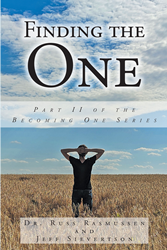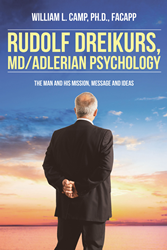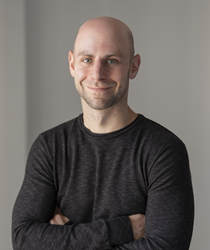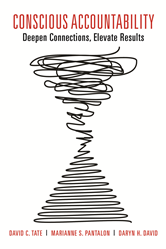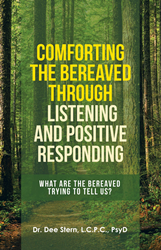“Through the CONNECT framework, we give you the tools to better relate to everyone in your professional and personal life,” — David C. Tate
ALEXANDRIA, Va. (PRWEB)
August 16, 2022
In Conscious Accountability: Deepen Connections, Elevate Results (ATD Press, August 2022), Yale faculty, psychologists, and leadership consultants David C. Tate, Marianne S. Pantalon, and Daryn H. David challenge leaders to elevate workplace results and personal and professional fulfillment by adopting the practice of conscious accountability.
Accountability is everywhere, showing up in family relationships, friendships, and other communities such as workplaces. As the authors explain, accountability functions as the invisible thread that connects people to one another and enables more effective interactions. Accountability done well can mean the difference between success and failure, between the extraordinary and the mediocre, and even between life and death.
Because the world of work is changing, accountability also needs to evolve. People are facing greater responsibilities and stresses, time and resource constraints, and increased remote work. Given these trends, it is more important than ever that accountability goes beyond the transactional—motivated by fear of reprisals or purely obligatory in nature—to a transformational process that focuses on learning, improvement, and shared responsibility.
This can be achieved through conscious accountability, which the authors define as expanding awareness of oneself to create deliberate intentions, take informed actions, and be responsible for one’s impact and effect on other people. This fresh take on accountability promises more meaning, joy, fulfillment, and excellence.
Tate, Pantalon, and David introduce the CONNECT framework of seven practices to help people work and lead with conscious accountability:
-
Creating clarity establishes a clear vision with shared meaning, goals, and expectations.
- Opening up engagement is about creating the conditions in which people feel safe and free to express themselves and feel committed to working together to complete the tasks at hand.
- Nailing it means people following through on what they say they will do and ensuring that others are doing the same.
- Noticing is when people pay attention to what they are seeing outwardly and experiencing internally and actively check in with others with compassionate curiosity about their own observations.
- Exchanging feedback involves soliciting, receiving, and giving feedback to help oneself and others expand awareness, learn what is or is not working, and make any necessary course corrections.
- Claiming it is about taking ownership and responsibility for the results—both the successes and the failures—and consolidating the learning without blaming others.
- Trying again is about taking what you have learned from an experience and applying it in the next situation.
“We invite you to think about yourself and others in your life more completely and to try out new ways of thinking and acting,” says Tate. “Through the CONNECT framework, we give you the tools to better relate to everyone in your professional and personal life—to raise your understanding and awareness of basic human needs like autonomy, mastery, and belonging; to put people in a position to succeed and inspire excellence everywhere you turn; to enjoy more meaningful relationships; and to surpass your goals.”
Adopting the practice of conscious accountability can help foster workplace outcomes including greater trust among employees, enhanced teamwork, and better business alignment and productivity. The authors provide an action plan for applying conscious accountability to a single relationship, a single practice, or in implementing the full model. They also encourage readers to use an experiential framework that allows learning to inform future efforts to practice.
About the Authors
David C. Tate, PhD, is a licensed clinical psychologist, executive coach, and organizational consultant. He is the co-founder and CEO of Conscious Growth Partners, a boutique consultancy that focuses on helping organizations realize their potential through better leadership, teamwork, and culture. David is on the faculty at Yale University in the schools of medicine and management, where he teaches leadership courses within graduate and executive education programs. He coaches global leaders within the Yale Greenberg World Fellows Program. David co-authored the book Sink or Swim: How Lessons From the Titanic Can Save Your Family Business. David received a BS from Cornell University and a PhD in clinical psychology from the University of Virginia. He completed pre- and post-doctoral fellowships at Yale University before joining the faculty.
Marianne S. Pantalon, PhD, is a consulting and clinical psychologist, executive coach, and instructional designer. She is the co-founder and chief strategy officer at Conscious Growth Partners, a mission-focused consulting firm that helps organizations flourish through improved leadership, teamwork, and culture. In addition, she serves as a senior facilitator at the Yale School of Management, where she supports students in becoming powerful global leaders. Marianne loves the intersection of design, technology, and psychology. She fulfills this passion as the primary investigator of an NIH Small Business Innovation Research grant for building digital health technology. A creative at heart, Marianne studied psychology and film as an undergraduate at Binghamton University and earned her PhD at Hofstra University, where she investigated the psychological effects of writing.
Daryn H. David, PhD, is a licensed clinical psychologist, educator, and leadership development coach. At the Yale School of Medicine, she holds a faculty appointment at the Child Study Center and serves as associate director for leadership development in the Offices of Academic & Professional Development and Diversity, Equity, & Inclusion. Through dynamic pedagogy and coaching programs, Daryn leverages her expertise to help academics and healthcare providers actualize their fullest professional potential. She further promotes the university’s educational mission by coaching within the Yale Greenberg World Fellows Program. Daryn holds an AB from Harvard University and PhD in psychology from Yale University. She completed a postdoctoral science policy fellowship at the National Institutes of Health and maintains a psychotherapy and coaching practice devoted to women professionals.
About ATD Press
The Association for Talent Development (ATD) is the world’s largest association dedicated to those who develop talent in organizations. ATD’s members come from more than 120 countries and work in public and private organizations in every industry sector. ATD Press publications are written by industry thought leaders and offer anyone who works with adult learners the best practices, academic theory, and guidance necessary to move the profession forward. For more information, visit td.org/books.
Conscious Accountability: Deepen Connections, Elevate Results
ISBN: 9781950496716 | 292 Pages | Paperback
td.org/book/conscious-accountability
To order books from ATD Press, call 800.628.2783.
To schedule an interview with any of the authors, please contact Kay Hechler, ATD Press senior marketing manager, at khechler@td.org or 703.683.8178.
*****
An Interview with David C. Tate, Marianne S. Pantalon, and Daryn H. David, Authors of Conscious Accountability
Why does accountability matter?
David: Accountability is at the heart of things in life that matter the most. Its presence or absence makes the difference between success or failure, relationships that thrive or relationships that wither, a good or bad reputation, and, in some cases, life or death. We all have needs and expectations of ourselves and one another, regardless of whether we talk about them explicitly. Accountability is about whether and how we live up to those expectations. I’ve come to see the importance of accountability in all kinds of settings and relationships.
Daryn: Accountability is everywhere: business, relationships, the classroom, and—in the fields I am most familiar with—academic medicine and healthcare. For example, research suggests that healthcare delivery runs smoothest and safest when medical teams work in a climate of high psychological safety and accountability to one another. It is crucially important that patients feel that their clinicians are accountable to them, not only by bringing medical expertise but also by engaging in a process of shared treatment decision-making. This gets to the reason we wrote this book: to shift our focus beyond the outcome (deliverable) to consider our impact on the people involved and the process through which we are relating to them. This is when accountability can really catalyze and improve our collective experience.
Marianne: I think of accountability as a behavioral expression of caring and love, and we need more of that in the world. Holding someone accountable is an act of personal investment. You are communicating, “I believe in you. I have confidence in you. I trust you. I have expectations of you. In my heart of hearts, I know you can do this, and I’m not letting you off the hook. Being accountable means you matter to me. I understand this is important, and I will make it a priority.”
When we come together to share accountability and look at it as a collective responsibility, we can leverage our primitive nature as social animals who have thrived because of what we can accomplish together. When this happens, perspectives broaden, compassion grows, and we let go of the fear that makes us dig our feet in. We open our hearts.
What is conscious accountability, and how did it evolve?
David: Several years ago, I was asked to design a workshop on accountability. In studying existing models for building systems of accountability, some things I saw appeared more mechanical and lacked a deeper understanding of how human beings in fact operate. I also learned that some notions of accountability leave people feeling fearful and isolated instead of feeling connected and empowered. I began to appreciate how greater awareness of self and others could contribute to a more humanistic take on accountability. Building on this foundation, my colleagues and I developed the concept that we introduce in the book: conscious accountability. We define conscious accountability as expanding awareness to create deliberate intentions, take informed actions, and be responsible for one’s impact.
How is conscious accountability different from the idea of being accountable?
David: Conscious accountability takes accountability to a higher level. There are a few key differences between conscious accountability and traditional notions of accountability—or what we call “accountability 1.0.”
- Accountability 1.0 focuses on the bottom-line results: “Did you hit your numbers?” Conscious accountability focuses both on results and on how relationships are affected: “Did we hit our numbers, and how did people like working together?”
- In accountability 1.0, there’s an emphasis on individual responsibility and attending to only your own responsibilities. Conscious accountability emphasizes shared responsibilities and being aware of how others are doing as they work towards shared goals.
- Finally, when something goes wrong or when people make mistakes, people with an accountability 1.0 mindset ask, “Who was at fault? Who needs to be held accountable?” Instead of blame, conscious accountability focuses on who is responsible for fixing things and on what can be learned from mistakes, so everyone can grow and get better together.
The net result of these differences is that conscious accountability is transformational. It allows you to not only win the game but also to change the way the game is played, so it’s more satisfying and efficient in the long run. When people work together like this, they can feel the difference. There is excitement for the work and for the human interactions it takes to get the work done. There’s more authenticity; people get to be themselves without fear of judgments or reprisals. It’s refreshing to witness and even better to experience.
What are the first practical steps people can take to begin practicing conscious accountability?
David: There’s no one way to start practicing conscious accountability. Our CONNECT framework describes seven practices that support conscious accountability:
- Creating clarity in goals and expectations
- Opening up engagement
- Nailing it
- Noticing
- Exchanging feedback
- Claiming it
- Trying again
You can begin to make headway by trying any one of them. One colleague who read the book was inspired to work on creating clarity in setting expectations. He shared that he used to tell people, “I’ll get this draft to you next week,” but now will give a specific day and time. He found that it helps him focus on meeting the expectation he sets, and that his clients and colleagues have appreciated the change.
Daryn: There are so many possibilities here. You could start by trying out any of the practices in the book, in any order, in any facet of your life. Perhaps this means checking in twice, instead of once, to ensure that someone to whom you have delegated work understands what you are asking. Or perhaps this means being brave by standing up and taking responsibility for your contribution to a project (at work or in your personal life) that went unexpectedly awry. At its heart, becoming more consciously accountable is about intention—bringing a spirit of exploration to trying out the steps of the conscious accountability model and learning from your attempts. Giving grace toward yourself and one another is key to this process.
Marianne: Taking some time to reflect on your life is a lovely place to start. Allow yourself to meander in your mind’s eye through your life, past and present, and see what bubbles to the surface when you consider accountability. You might remember someone you admired for their accountability or, perhaps, a challenging experience with accountability. Whatever comes up, explore what is meaningful about it. Then consider what practice might help you bring more satisfaction and meaning into your life, in your actions and connections with others.
Do a small experiment. You might try the practice of Noticing by being more observant during a one-on-one discussion, and then speaking about what you observed. Share with the other person that you are working to develop this part of yourself and ask what that shift was like for them. Then harvest the learning from this experiment. Was it fruitful or engaging for you? How did it make you feel? What feedback did you receive? Review and consider if it is worth trying again and what adjustments you might make.
Who is this book/framework for?
David: This book is for people who work with others and must rely on them to get things done. That is especially true for current or aspiring managers and leaders inside of organizations. But it also applies equally to people who want to be more effective as they interact with others in their families, in school or educational systems, on sports teams, in religious communities, or in volunteer or community organizations.
Daryn: As David said, this framework is for anyone who is working interdependently with others. Anytime individuals are trying to reach a common goal or outcome, a consideration of the interpersonal is crucial. The conscious accountability framework privileges this by putting awareness of our intentions and our relationships front and center.
Marianne: This book is for anyone who cringes when that memory of letting a person (or people) down pops into their mind. Conversely, it is also for people who consistently feel let down, who hate group projects, but who desire to be a more compassionate and inspiring team player. This book shows you how you can do and be better. It shows you how to handle the times when the ball is dropped, when deliverables are late, and when expectations have not been met. There is a way forward that is not shaming or punishing but a way that can strengthen bonds and help you avoid this same type of situation again.
What are some of the results you’ve seen when people or workplaces adopt a conscious accountability approach?
David: I recently coached an executive who was extremely efficient and effective in driving results but was not aware of his impact on others. Many people found him unpleasant to work with, and some were even afraid of him because he asked piercing questions that made them feel incompetent. When he received honest feedback about how others were feeling, he was able to modify his approach, which softened some of his harder edges and made him much more effective when working with others. In this way, his improved awareness allowed him to continue to drive strong results in a way that was better for relationships too.
Daryn: In my own line of work, I am very excited by the promise of the accountability model for healthcare practitioners and leaders in academic medicine. Many of the book’s teachings about communicating clearly, building commitment and trust, and sharing feedback are bedrock ingredients for effective teaming and interpersonal relating, which are crucially important for medical professionals to practice in their line of work.
The conscious accountability concepts are also integral to coaching academics and clinicians who are seeking to enhance their leadership vision and presence. Because success in the field of academic medicine is often measured by individual success and accomplishment, it is my hope that the seven practices of conscious accountability will encourage people to take a different tack that is increasingly open to vulnerable communication and deep collaboration while serving one another and learning from mistakes.
In my years working as a psychotherapist, I’ve also witnessed how often the source of interpersonal misunderstanding and conflict lies in making assumptions about another person or situation, often based on the history that may exist between these two people. The conscious accountability practices that encourage us to assume a beginner’s mind—bringing humility, compassionate curiosity, and the courage to really listen to each other—offer us an escape from the old bind, opening the door instead to increased clarity, connection, and fresh, potentially transformational ways of communicating with the important people in our lives.
Marianne: I’ve been working with a business leader who considered themselves to be so highly accountable to their customers and staff that it was starting to become a problem. They desired harmony at all costs, and, as a result, they were increasingly unhappy in their roles, neglectful of their own well-being, and ready to shut the whole business down. Their watershed moment came when they realized that accountability is not a one-way street but rather a collective endeavor. When only one person carries all the weight of being accountable, no one is served. Relationships are strained, opportunities for development are missed, blame is thrown around, problem-solving is constricted, and people feel disengaged and uninspired. Shifting their mindset to one of shared accountability decreased tension, allowed them to grow into the leaders they want to be, enabled creative solutions to emerge, and empowered their staff to design their own professional development.
How can conscious accountability help in environments where remote/hybrid teams are becoming much more commonplace?
Marianne: Transitioning to a hybrid environment has shown us just how capable we are of adapting and working effectively out of the office. However, it has not been without challenges. Numerous managers have lamented that they are missing all the check-ins, brief observations, jokes, and the emotions of moments—they simply cannot get these things now that all or some of their team members are remote. The shift to remote or hybrid work has made it harder to maintain a culture of being accountable to both the work product and team morale.
In coaching team leaders on this challenge, I ask them to reflect upon what happens naturally when people gather in person: What are the benefits and the challenges? This is where conscious accountability comes in. By becoming more conscious of what is different, leaders can then make better and more intentional decisions about how to rebuild or build anew. This requires developing an explicit understanding of the situation and goals and adjusting accordingly.
Actions such as carving out time during team meetings to check in, breaking larger meetings up into smaller groups, or posting a daily icebreaker question on their slack channels help people connect and engage.
Creating an activity where you ask your team members for ideas on how they would like to interact and participate to deepen connections and results invites the team to contribute and buy-into new ways of meeting and working together.
These methods ultimately help all team members become more aware and consciously accountable of their respective roles, participation, and commitment to each other.
Our lives are only getting busier and more complex. How can conscious accountability help us manage and balance all the competing demands?
David: We were just discussing remote and hybrid work. This affords people more flexibility, but it also blurs the boundaries between times and places that are designated for work versus other important aspects of life. Where conscious accountability can help is in becoming more aware of our own values, preferences, and needs. Getting clarity about our own goals and expectations (for ourselves as well as what we want for other people) can help us better look at the big picture and notice the things that do or do not support our vision for what we want our lives to look like. A recent example for me was making the intentional decision to take a real vacation, with no working or checking email while I was away. The result was I had a much better time with my family, felt much more relaxed, and came back feeling regenerated and excited to dive back into work.
Where does trust come into play with conscious accountability?
David: Trust is the bedrock of healthy relationships. It can take a long time to develop trust, but it takes little time to erode it. Conscious accountability helps build trust and credibility. Being clear and transparent in communication, demonstrating awareness of other peoples’ needs—and that you are tuned in and care about them—establishing conditions of psychological safety, and having our words and actions match one another are examples of applying conscious accountability to build trust and credibility. These things support developing trust and bringing about better relationships and workplace results.
Daryn: If there is no trust, there is no ability for people to work together openly, honestly, and authentically. For people to trust one another, they’ve got to be willing to address difficult issues as they arise. In my work as an educator, I sometimes hear from trainees that their research advisor doesn’t address their needs adequately. For example, perhaps the mentor suggests that the trainee work on a project that the mentor needs to get done or guides the trainee to apply for a certain type of job—neither of which is in line with the trainee’s interests or career-building plans.
In situations like these, the first questions I ask the trainee are how much they trust their advisor and how comfortable they feel sharing concerns. If there is no trust, the trainee will often choose to put their head down and power through this subpar situation. But if there is trust—voila! The door is open for the trainee to manage up more effectively, using many of the different tools comprised in this book. Perhaps the trainee will commit to communicating their needs more clearly, or to providing the mentor with timely feedback about how they are working together. The potential for both people to understand each other more fully—and to work together more productively—has been exploded open. And trust provided the alchemy needed to get the ball rolling.
Marianne: Trust and accountability—it seems like a chicken and egg situation: Which comes first? Trust is critical if you want relationships that feel close, secure, and meaningful. It is also critical if you work with others and want to perform well. Many factors influence our level of trust and our sense of trust changes.
Developing trust is often context dependent. There can be situations where either you feel others don’t trust you, or you don’t trust others. For example, I felt others did not trust me when, as a white, middle-class woman, I offered psychological services in an educational setting serving individuals from various racial and ethnic backgrounds who were also economically disadvantaged. They wanted to know how I could possibly understand or relate to any of their challenges. The truth is I would never be able to really know or fully understand their situation, and I needed to be transparent with them about that, while at the same time, communicating that we all have experiences that come with being human. It was critical that I dealt with their worries head-on and created a safe environment where their opinions and concerns would be acknowledged and respected. I invited them to share their feelings. I listened to them and asked questions. In showing openness and exposing my own vulnerability, they became open to what I could offer and the potential of working together. We developed trust, and we held each other accountable through greater awareness.
How have each of you become more consciously accountable?
David: Becoming more consciously accountable is not really something any of us ever fully achieves, but it is something we can always practice and work at improving over time. One of the things that has helped me is my practice of journaling. It encourages me to pause and reflect on my own experience—what am I thinking and feeling? What do I need in a situation? Have I communicated those needs to others? It also helps me pause to ask myself questions like, “Who are the other people, and what is it that they want and need in this situation?” It’s easy to slip into “tunnel vision” and focus only on myself and getting through my to-do list. Journaling helps me notice what’s going on internally and externally, so I can respond in a fuller, more informed way.
Daryn: I have become more consciously accountable to myself, trusting what I know to be my truth in a situation and being more willing to invite people into that truth when needed, in the workplace or otherwise. I do this by bringing problems to the fore and addressing them with transparency and candor. Becoming more consciously accountable is a journey—and one that I feel increasingly committed to in my personal and professional life.
Marianne: This certainly is a journey for me. Previously, I pushed through hard times and resisted asking others for help from fears I would burden them. I internalized the belief that the buck stops with me, and I looked at accountability as an individual sport. As a result, I sometimes allowed myself to keep people at arm’s length, which has been unfortunate for my own growth and my enjoyment of relationships. While I have a strong reputation for following through and doing what I say I will do, there were times when I could have been more vulnerable and let others step in when I needed support. I’ve also sacrificed my well-being by driving myself into the ground to fulfill commitments.
I am working diligently at shifting my approach. Through the practice of conscious accountability, my growth edge has been to let go and let in, and there have been some incredible results. For example, I kept putting off disclosing to a work partner some health issues I was having. When I finally embraced the courage to share, they could not have been more supportive, kind, and flexible. Their expression of support allowed me to complete my part of the work in a much healthier way and allowed me the tender experience of feeling heard and connected. It ultimately helped me forge a richer relationship with the partner. Greater trust and deeper connections are the rewards for practicing conscious accountability.


